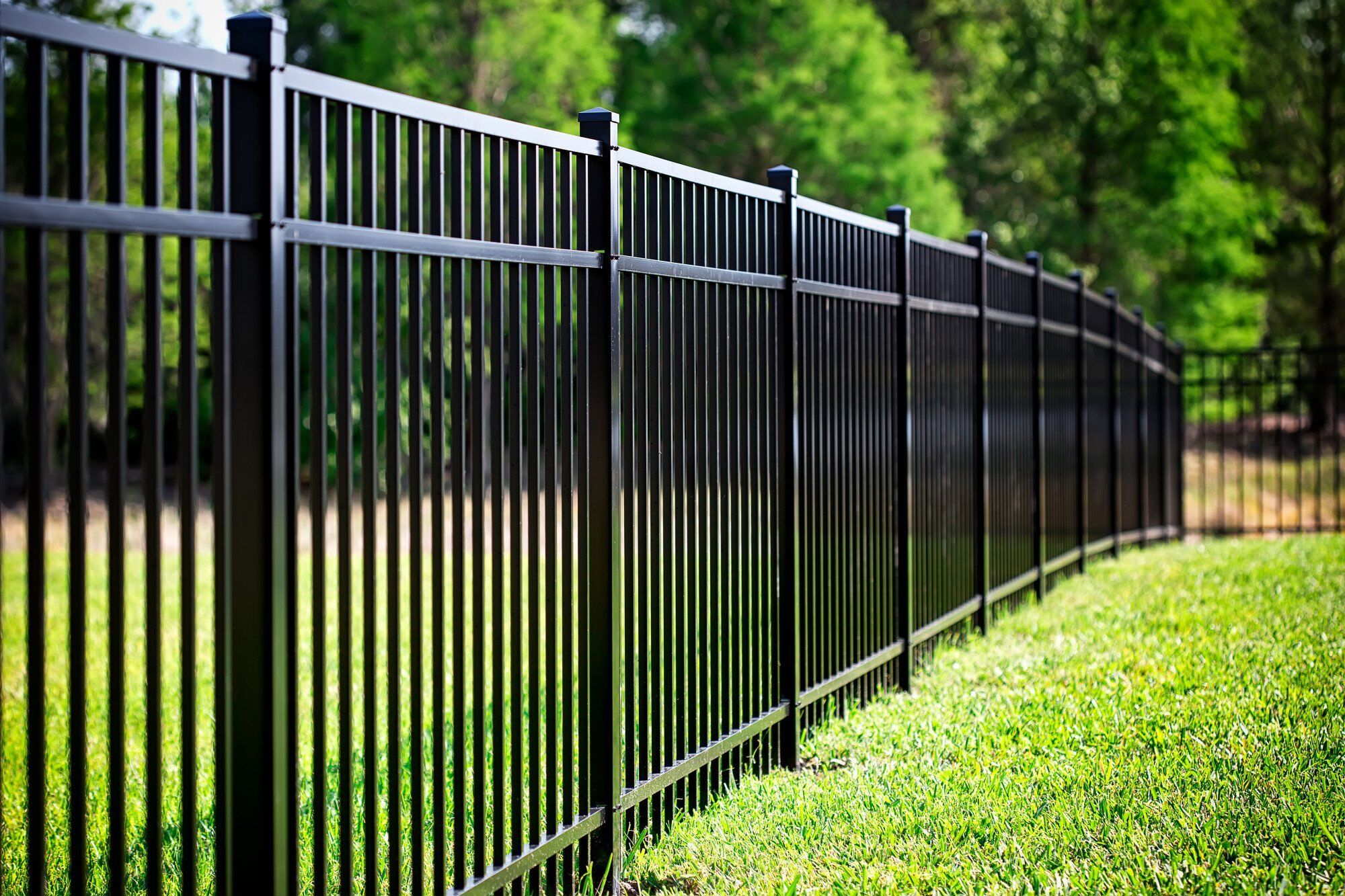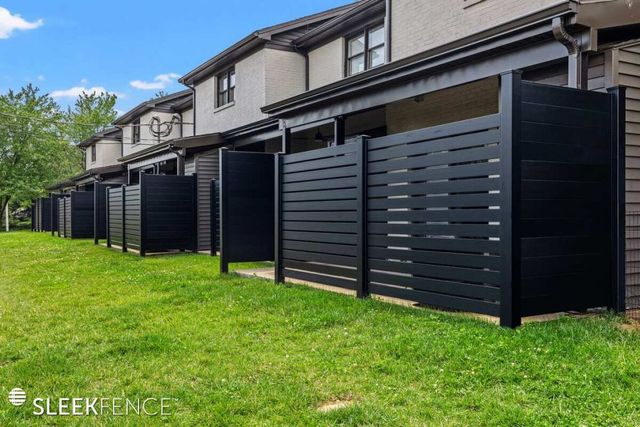All Categories
Featured
Choosing the ideal type of fence for your home is a decision that requires thoughtful factor to consider of a number of variables, from the product and style to its objective and upkeep demands. A fencing not only serves useful features such as safety and security and personal privacy yet can also boost the visual appeal of your home. With a selection of materials readily available, it's necessary to recognize what jobs best for your specific requirements.
![]()
Privacy: If your objective is to shut out the sight from neighbors or passersby, you'll desire a solid fence without any gaps. Products like timber, compound, and vinyl are prominent options for personal privacy fencings. They provide the essential insurance coverage to ensure a secluded backyard or yard room. Safety: For keeping trespassers out or safeguarding pets and children, you'll require a strong, high fence. Steel fencings such as chain, steel, or aluminum web link deal terrific resilience and are tough to climb. These products are also perfect for producing a safe perimeter around your property. Visual Appeal: If the purpose of your fencing is much more decorative than practical, you might choose a picket fencing, wrought iron, or a split rail fence. These choices provide an eye-catching boundary without offering total privacy. 2. Consider Your Spending plan. Your budget plan will certainly play a vital function in your choice. Different products come with differing price factors, so it is essential to consider just how much you agree to spend. Here are some basic guidelines:
Timber Fencing: One of one of the most cost-efficient alternatives, timber fencings can be personalized and mounted conveniently, though they call for upkeep to stop rot and bending. Normal discoloration or paint is necessary to preserve its look and toughness. Vinyl Fence: While vinyl is more expensive in advance than timber, it's a low-maintenance alternative. Plastic fences do not need paint, staining, or sealing, and they are immune to degeneration, fading, and bugs. They can be susceptible to cracking in severe cold temperature levels. Chain Link Fence: If your main priority is keeping costs reduced, wire mesh fence are the most affordable choice. While they don't supply a lot in regards to personal privacy, they're practical for protecting pets and noting building limits. Metal Fence (Aluminum or Steel): Metal fencings are long lasting, long-lasting, and essentially maintenance-free. While they can be more expensive than timber or chain web link, they use added safety and a sleek, contemporary look. 3. Resilience and Maintenance Demands. Think of the long-lasting resilience of your fencing and just how much effort and time you want to purchase upkeep:
![]()
Timber: While timber provides an all-natural look, it requires routine upkeep, including sealing and discoloring, to shield it from the components. Wood fencings can last 10-15 years with proper maintenance. Vinyl: Plastic fences are low-maintenance and are extremely sturdy. They will not rot, warp, or fade over time. As soon as set up, you can expect a vinyl fence to last for several decades with very little treatment. Metal: Light weight aluminum and steel fences are extremely long lasting and require little to no maintenance. Aluminum will not rust, and steel can be treated with a safety layer to stop rust. Both options can stand up to harsh weather and are best for lasting use. Chain Link: Although chain link fences are lasting and sturdy, they might require periodic fixings, particularly if the galvanized finishing begins to subside. They can rust with time, though contemporary layers like plastic are available to extend the life-span. 4. Consider Aesthetic Charm. The style and layout of the fence must complement the style of your building. Consider the overall visual you desire to accomplish:
Conventional Homes: For more timeless, typical buildings, a wood or wrought iron fence may be the very best fit. These products supply a classic allure and can be tailored to match the style of your home. Modern or Contemporary Houses: If you have a modern-day home, you might wish to select smooth, minimalistic materials like light weight aluminum or plastic. These fences provide a clean look and can be customized with various shades or coatings. Farm or Country Setups: For larger properties or country settings, split-rail or ranch-style fencings can supply a genuine look and appropriate for specifying property boundaries while still permitting for an open view. 5. Climate Factors to consider. The climate in your area plays an important role in determining the very best product for your fencing. If you stay in an area with high moisture or heavy rainfall, wood may warp or rot unless dealt with effectively. Plastic and metal choices, nevertheless, perform well in many environments and are less prone to damages brought on by moisture.
![]()
Final thought. Choosing the best fencing for your residential property depends upon recognizing your demands, budget plan, and personal preferences. Whether you're prioritizing personal privacy, security, visual appeals, or low upkeep, there is a large range of alternatives readily available. By considering the material, resilience, and style of your fencing, you can guarantee that it improves the feature and appearance of your home for many years to come.

- Assess the Function of the Fencing. The initial step in choosing the excellent fence is recognizing its main function. The kind of fence you pick will depend on what you intend to achieve:
Privacy: If your objective is to shut out the sight from neighbors or passersby, you'll desire a solid fence without any gaps. Products like timber, compound, and vinyl are prominent options for personal privacy fencings. They provide the essential insurance coverage to ensure a secluded backyard or yard room. Safety: For keeping trespassers out or safeguarding pets and children, you'll require a strong, high fence. Steel fencings such as chain, steel, or aluminum web link deal terrific resilience and are tough to climb. These products are also perfect for producing a safe perimeter around your property. Visual Appeal: If the purpose of your fencing is much more decorative than practical, you might choose a picket fencing, wrought iron, or a split rail fence. These choices provide an eye-catching boundary without offering total privacy. 2. Consider Your Spending plan. Your budget plan will certainly play a vital function in your choice. Different products come with differing price factors, so it is essential to consider just how much you agree to spend. Here are some basic guidelines:
Timber Fencing: One of one of the most cost-efficient alternatives, timber fencings can be personalized and mounted conveniently, though they call for upkeep to stop rot and bending. Normal discoloration or paint is necessary to preserve its look and toughness. Vinyl Fence: While vinyl is more expensive in advance than timber, it's a low-maintenance alternative. Plastic fences do not need paint, staining, or sealing, and they are immune to degeneration, fading, and bugs. They can be susceptible to cracking in severe cold temperature levels. Chain Link Fence: If your main priority is keeping costs reduced, wire mesh fence are the most affordable choice. While they don't supply a lot in regards to personal privacy, they're practical for protecting pets and noting building limits. Metal Fence (Aluminum or Steel): Metal fencings are long lasting, long-lasting, and essentially maintenance-free. While they can be more expensive than timber or chain web link, they use added safety and a sleek, contemporary look. 3. Resilience and Maintenance Demands. Think of the long-lasting resilience of your fencing and just how much effort and time you want to purchase upkeep:

Timber: While timber provides an all-natural look, it requires routine upkeep, including sealing and discoloring, to shield it from the components. Wood fencings can last 10-15 years with proper maintenance. Vinyl: Plastic fences are low-maintenance and are extremely sturdy. They will not rot, warp, or fade over time. As soon as set up, you can expect a vinyl fence to last for several decades with very little treatment. Metal: Light weight aluminum and steel fences are extremely long lasting and require little to no maintenance. Aluminum will not rust, and steel can be treated with a safety layer to stop rust. Both options can stand up to harsh weather and are best for lasting use. Chain Link: Although chain link fences are lasting and sturdy, they might require periodic fixings, particularly if the galvanized finishing begins to subside. They can rust with time, though contemporary layers like plastic are available to extend the life-span. 4. Consider Aesthetic Charm. The style and layout of the fence must complement the style of your building. Consider the overall visual you desire to accomplish:
Conventional Homes: For more timeless, typical buildings, a wood or wrought iron fence may be the very best fit. These products supply a classic allure and can be tailored to match the style of your home. Modern or Contemporary Houses: If you have a modern-day home, you might wish to select smooth, minimalistic materials like light weight aluminum or plastic. These fences provide a clean look and can be customized with various shades or coatings. Farm or Country Setups: For larger properties or country settings, split-rail or ranch-style fencings can supply a genuine look and appropriate for specifying property boundaries while still permitting for an open view. 5. Climate Factors to consider. The climate in your area plays an important role in determining the very best product for your fencing. If you stay in an area with high moisture or heavy rainfall, wood may warp or rot unless dealt with effectively. Plastic and metal choices, nevertheless, perform well in many environments and are less prone to damages brought on by moisture.

- Local Regulations and HOA Standards. Prior to completing your fencing choice, make sure to consult your neighborhood town or homeowners association (HOA) for any restrictions pertaining to fencing height, products, or style. Many areas have details policies in area, and it's vital to abide to prevent prospective penalties or needing to take apart the fencing.
Final thought. Choosing the best fencing for your residential property depends upon recognizing your demands, budget plan, and personal preferences. Whether you're prioritizing personal privacy, security, visual appeals, or low upkeep, there is a large range of alternatives readily available. By considering the material, resilience, and style of your fencing, you can guarantee that it improves the feature and appearance of your home for many years to come.
Latest Posts
Reputable Expenses Door Solutions for Houses and Organizations
Published May 23, 25
1 min read
Discover Oil Changes & More: Complete Auto Care Solutions from Montclare Auto Repair
Published May 23, 25
1 min read
How Regular Auto Maintenance at Montclare Auto Repair Reduces Costs
Published May 23, 25
1 min read
More
Latest Posts
Reputable Expenses Door Solutions for Houses and Organizations
Published May 23, 25
1 min read
Discover Oil Changes & More: Complete Auto Care Solutions from Montclare Auto Repair
Published May 23, 25
1 min read
How Regular Auto Maintenance at Montclare Auto Repair Reduces Costs
Published May 23, 25
1 min read